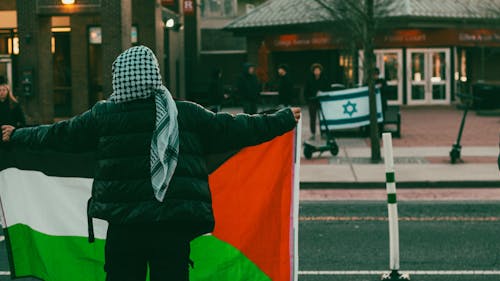COMMENTARY: For us to be friends, we have to be allies first

"Where are you from?"
This is the most common question every child of immigrant parents hears. But for Palestinians, the answer changes depending on who we are talking to. Often, it changes to "Middle-Eastern" for the purposes of protection or convenience.
On the other hand, there is a famous joke within my community that Palestinians will constantly remind you of their identity, considering how controversial and politicized it is. We are exhausted from being seen as outcasts, so we normalize our existence by using our voices as our form of resistance.
The truth is, we do not talk about how revolutionary it is to be Palestinian and that our existence in itself is resistance. Despite the Israeli government casting Palestinians like myself, a regular college student, as the biggest threat to its existence, we still survive, prevail and persist in our calls for freedom.
And so, with pride, I say, "My blood is Palestinian."
When I tell some of my Jewish peers that I am Palestinian, the atmosphere changes. Rutgers has the largest Jewish undergraduate population of any U.S. public university, according to Hillel International.
Palestinians know a Zionist when we see one — they do not have to tell us, for we can easily tell from their demeanor and language. Politics are very personal to us both, and the obvious conclusion is that we cannot be friends if we disagree, for disagreeing about someone else's humanity is uncompromisable. Therefore, we must have honest, respectful conversations if we want to move forward.
But do I actually want to have this conversation? Do I want to be vulnerable, tell them how I feel and risk getting hurt all over again? If I tell them the truth, will they still see me as a terrorist or an anti-Semite? Will they trust the Israeli government's media campaign over my experiences?
When Palestinians tell others their untold stories, they are telling them from a place of trust and hurt. We do not share for superficial reasons but to raise awareness, join our struggle and echo our calls for liberation.
For us to be friends, we have to be allies first.
Being friends with a Palestinian has its obligations. Recently, I have noticed that many people want to learn Arabic, have Arabic tattoos, listen to our music and eat our food. It is an odd experience because I remember a time when these same people seemed to hate us. I only wish that Zionists or Israeli settlers loved us as much as they love our culture.
The truth is that Palestinians are the real winners in this struggle. After so much loss, how can the Israeli government and the rest of the world justify Palestinian death with its geography?
Israeli Prime Minister Benjamin Netanyahu is currently fighting a war of desperation. Palestinians are angry, and, due to his poor leadership, so are his constituents.
Typically, in a democracy, there is a peaceful transition of power, but Israel has been consistent in displaying itself as a unique state that does not follow regular norms — specifically international human rights norms.
Israeli democracy is an oxymoron: It may be electorally democratic, but socially, it is far from a democracy. To clarify, if your idea of democracy means freedom for one person at the expense of another, you must re-evaluate your moral compass and definitions immediately.
So, if Netanyahu does not win (and I believe he will not), where does that leave him and his far-Right government? The irony remains that, as much as the state of Israel describes itself as a safe haven for Jews, it has only endangered their survival.
Both before and since Oct. 7, 2023, Palestinians are continually displayed as collateral damage for the sake of the Jewish state. We have experienced apartheid, occupation, imprisonment of innocent civilians (including children), checkpoints, cultural appropriation, settler-colonial rule, ethnic cleansing, carpet bombing and more. After 75 years of atrocities, how can Israelis and Zionists face these harsh truths after we liberate Palestine from the river to the sea?
We took in Jewish refugees, but then they took advantage of us and our land, justifying it with a divine decree.
Is there another poetic way to explain that God is not your real estate agent? Palestinians are not interested in granting amnesty to their colonizers. We urge the Rutgers community to denounce Zionism and implore the University to divest from Israeli apartheid in line with the Boycott, Divestment and Sanctions movement.
To the Rutgers students who support Zionism: As a Palestinian who is passionate about combatting Zionism, Islamophobia and racism, I strongly believe that the fight against antisemitism and Islamophobia are intertwined. The conflation of Zionism with the Jewish community is harmful and will not protect you.
Students for Justice in Palestine is a student organization at Rutgers University committed to supporting the Palestinian people's right to self-determination.
*Columns, cartoons and letters do not necessarily reflect the views of the Targum Publishing Company or its staff.
YOUR VOICE | The Daily Targum welcomes submissions from all readers. Guest columns and commentaries must be between 600 and 900 words. All authors must include their name, phone number, class year and college affiliation or department to be considered for publication. Please submit via email to oped@dailytargum.com by 4 p.m. to be considered for the following day's publication. Columns, cartoons and letters do not necessarily reflect the views of the Targum Publishing Company or its staff



